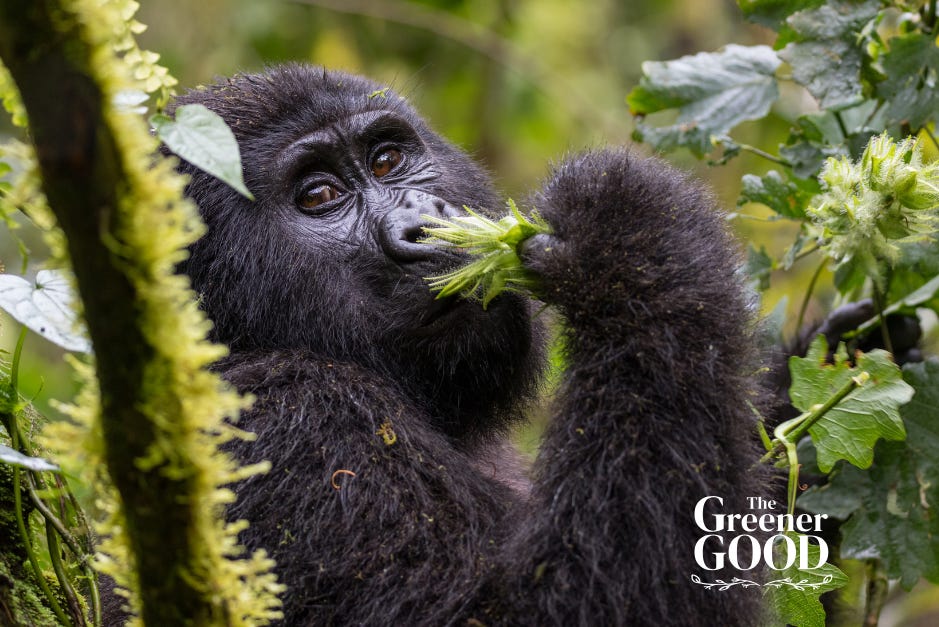Good News: Issue 7
Gorillas reintroduced into the wild, wooden wind turbines in the works, on-campus water recycling, and more
Friends, optimism is needed more than ever this week. Here in Ontario, Doug Ford just passed Bill 5, Protect Ontario by Unleashing our Economy Act — legislation that will gut the Endangered Species Act and create “special economic zones” that fast track developments without consulting First Nations.
I stayed optimistic until the bitter end, heartened by the collective action of First Nations, environmental groups, and citizens across the province. Thousands signed petitions, wrote letters, and protested. NDP, Liberal, and Green MPPs did their best to filibuster the bill. And even though I’m beyond disappointed in the outcome, the fight isn’t over. As Kiiwetinoong MPP and NDP deputy leader Sol Mamakwa said, this is “not the end of the conversation.”
After such a devastating outcome, it’s natural to feel anger and despair. But the answer isn’t apathy — it’s action. And there is positive action happening all the time. So let me share this week’s highlights, in hopes that these good news stories will give you a much-needed lift and inspire you to keep fighting and working for a brighter future. The planet needs good people like you.
Wooden wind turbine blades could slash carbon emissions
Wooden wind turbine blades are emerging as a sustainable alternative to traditional fiberglass and carbon fiber blades, which are not recyclable. German startup Voodin Blade Technology, in collaboration with Indian manufacturer Senvion, has developed turbine blades made of veneer lumber (LVL), which is created by binding multiple layers of thin wood with adhesive. Developed in the 1980s, LVL is stronger than traditional plywood and resistant to warping. It’s estimated that constructing blades from LVL could reduce carbon emissions by 78% and manufacturing costs by 28% compared to conventional blades. Plus they can be recycled.
The University of Texas planning on-campus water treatment
The University of Texas at Austin has announced plans for a massive wastewater reclamation and reuse system called the UT WaterHub. Built by Canadian company H2O Innovation, the facility will clean and recycle water on campus for cooling towers and boilers. With a capacity of 1 million gallons per day, the UT WaterHub will reduce potable water usage by 40% and sewer use by 70%.
Australia is greening its grid
Australia is undergoing a significant transformation in its energy grid, achieving its greenest quarter in early 2025, with renewables supplying 43% of electricity. Key drivers include an 85% surge in battery capacity and a 16% increase in rooftop solar, while coal and gas generation hit record lows. Under Prime Minister Anthony Albanese, re-elected in a landslide, Australia has embraced a renewable future, with widespread public support and calls for accelerated climate action. However, the country continues to contribute to global emissions through record-high thermal coal exports.
Gorillas successfully reintroduced into the wild
In a groundbreaking conservation effort, four female Grauer’s gorillas—rescued as infants from poaching and wildlife trafficking—have been successfully reintroduced into the wild at Mount Tshiaberimu in the Democratic Republic of Congo. After years of rehabilitation at the GRACE sanctuary, the gorillas were airlifted to Virunga National Park in late 2024. Within weeks, they adapted to life in the wild, joining a wild silverback male named Mwasa. This marks the largest-ever translocation of eastern lowland gorillas and offers renewed hope for the species, which faces critical endangerment due to habitat loss and conflict. Conservationists are optimistic that the females will provide a critical genetic boost to the small and isolated population of eight gorillas living on Mount Tshiaberimu.
Scientists have developed a method for removing PFAS from lithium batteries
Researchers from Colorado State University and Australia’s Commonwealth Scientific and Industrial Research Organisation (CSIRO) have identified a solution for removing toxic PFAS from lithium-ion batteries. Known as “forever chemicals,” PFAS are used in batteries to facilitate the movement of lithium ions and electricity. Researchers discovered that temperatures above 1,000°C can break down harmful compounds like PFAS into harmless elemental compounds. Although the ultimate goal is to replace PFAS with less toxic substances, this innovation could enhance recycling efficiency, recover valuable metals, and reduce long-term health and environmental risks linked to PFAS contamination.
Yours for the Greener Good,
Brett



